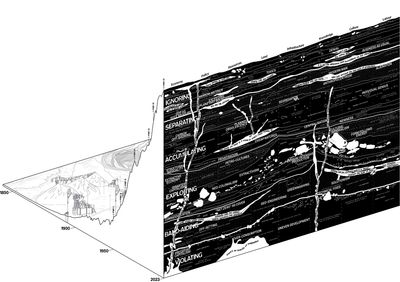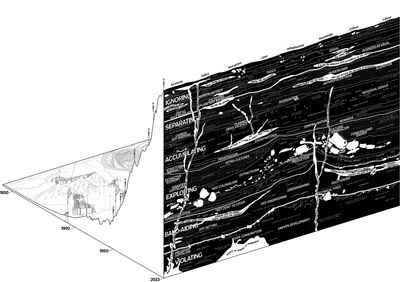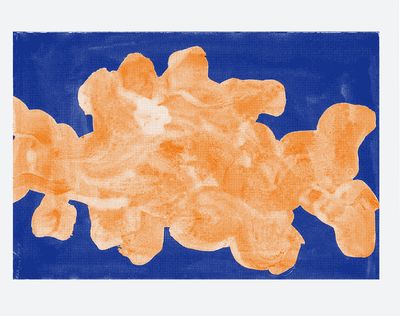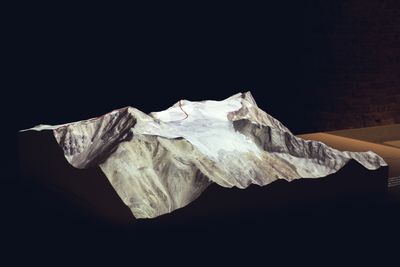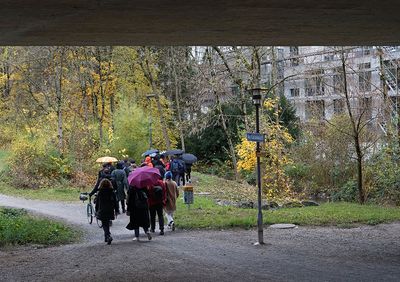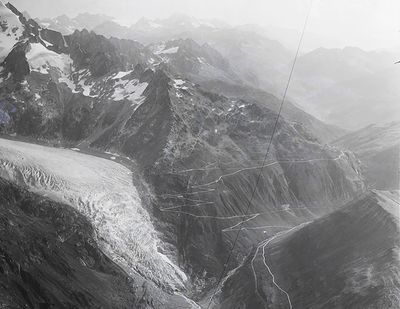Architecture Is ClimateAnthony Powis and Christina Serifi on behalf of MOULD
Architecture is Climate entangles architecture with the conditions of climate breakdown. Architectures and climates are not separate entities brought together in orchestrated moments. Instead, they are conditions that are produced through one another. For too long architecture has stood outside climate, seeing it as a problem to be fixed through technocratic intervention. But if architecture is climate, it becomes part of a febrile and disrupted world, vulnerable to its contingencies. No longer standing outside and applying superficial patches to the wounds of climate, architecture is climate binds the discipline and its humans to the scars, violence, and emotions of climate breakdown.
In this lecture we will discuss the binds between architecture and climate, and what they mean for architectural and climate futures. We cannot continue to ask the normative question: “What can architecture do for climate breakdown?” Instead, we must ask: “What does climate breakdown do to architecture?” Architecture has concretised our perilous energy dependency. Exposing these dependencies and reckoning with their causality of climate breakdown is the first step towards deconstructing and reforming the discipline of architecture.
Both material and social-cultural, both product and agent, architecture and climate therefore also have an opportunity to create alternative material and social-cultural configurations that nurture a different set of forces and functions. Responding to the urgent need for reinvention in the way we understand, practice, and teach architecture demands an engagement with activism, politics, and education. Architecture must become relational, subjective, and interconnected; both planetarily bound and supported; inclusive beyond the human; caring, curious, and brave. Architects can become part of the systemic change that climate breakdown calls for, reshaping social relations through alternative spatial formations and practices. Neither fixed nor rigid, other possible architectures are also other possible climates. Together, both might change and be changed.
Anthony Powis is concerned with architecture’s past, present, and future relationships with climate breakdown. His background is as an architect, working mostly on various types of public spaces (urban landscapes, museums, playgrounds) with muf architecture/art. Before that, he studied at Cardiff, Westminster, and the AA. His PhD (also at Westminster) was part of the project Monsoon Assemblages, which looked at the interactions between rapid urban development, and changing monsoon climates. His thesis focussed on Chennai and its subterranean environment: looking at ways in which different people generate knowledge about groundwater, the kinds of knowledge that is produced through different practices, its limits, and the forms of environmental stewardship that these different knowledges generate. Most recently, he has been part of the AHRC/DfG-funded project Architecture after Architecture: Spatial Practice in the Face of the Climate Emergency, alongside Tatjana Schneider, Christina Serifi, Jeremy Till, and Becca Voelcker. Together they are the research collective MOULD.
Christina Serifi is an architect, researcher and urbanist with a practice that intersects research, mapping visualisation and design, lying in the field of “critical spatial practice”. She is also co-founder of TiriLab an initiative and open platform which explores multi-cultural heritage related to local technologies, gastronomy and culture specifics from rural communities in northern Greece. Christina develops her professional practice through collaborations with local initiatives, professionals and academic institutions. She has coordinated various publications as Principal Researcher in Terreform, a New York Center for Advanced Urban Research, regarding indigenous knowledge, alternative educational models and self sufficiency. Her work investigates the forms, technologies, local practices and ecologies, and focuses on urban fragments, marginal spaces, as well as osculation of architectural and social space. Christina has been awarded with the Fulbright fellowship and is a selected Future Architecture Platform Fellow ‘20. She is currently working at the Institute for the History and Theory of Architecture and the City (GTAS) at the Technical University Braunschweig on the DFG/AHRC-funded project Architecture after Architecture. For current updates check mould.earth.
MOULD is a research collective working at the intersection of spatial practice and climate breakdown. They are a group of architects and academics based at Technische Universität Braunschweig, Central Saint Martins (UAL), Goldsmiths (University of London), and The University of Sheffield. Their current research project Architecture is Climate grew out of a research grant Architecture after Architecture: Spatial Practice in the Face of the Climate Emergency, funded by the German Research Foundation (DFG) and the UK Arts and Humanities Research Council (AHRC).
